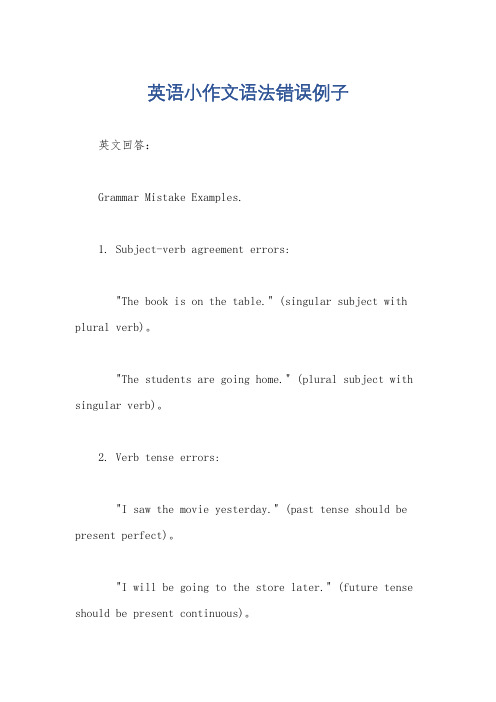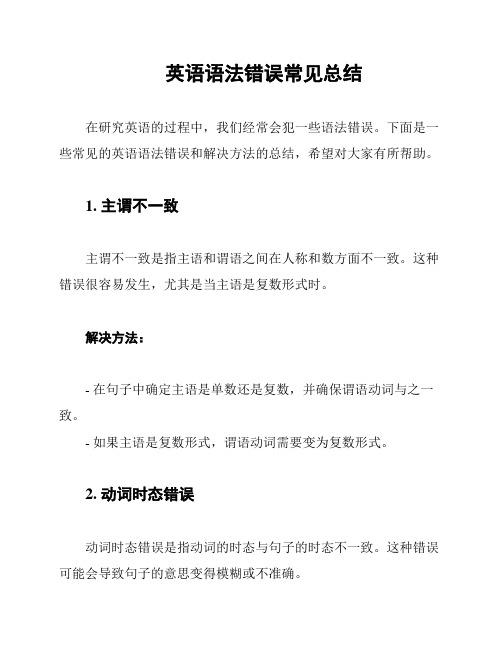文档英语常见语法错误大全
英语作文常见典型语法错误归纳

英语作文常见典型语法错误归纳1.句子成分残缺不全we always working till late at night before taking exams.(误)we are always working /we always work till late at night before taking exams(正)we should read books may be useful to us. (误)we should read books which may be useful to us. (正)2.句子成分多余this test is end, but there is another test is waiting for you. (误)one test ends, but another is waiting for you. (正)the driver of the red car was died on the spot. (误)the driver of the red car died on the spot. (正)3.主谓不一致someone/somebody think that reading should be selective. (误)some think that reading should be selective. (正)my sister go to the cinema at least once a week. (误)my sister goes to the cinema at least once a week. (正)4.动词时态、语态的误用i was walking along the road, and there are not so many cars on the street. (误)i was walking along the road and there were not so many vehicles on the street. (正)we have little time to read some books which we interest. (误)we have little time to read some books in which we are interested. (正)i am a student who has studying in the college for two years. (误)i have been studying in the college for two years(正)5.词类混淆it is my point that reading must be selectively. (误)in my opinion, reading must be selective. (正)honest is so important for everyperson. (误)honesty is so important for everyone. (正)the old man was hit by a car when he across the street. (误)the old man was hit by a car when he was crossing the street. (正)。
英语小作文语法错误例子

英语小作文语法错误例子英文回答:Grammar Mistake Examples.1. Subject-verb agreement errors:"The book is on the table." (singular subject with plural verb)。
"The students are going home." (plural subject with singular verb)。
2. Verb tense errors:"I saw the movie yesterday." (past tense should be present perfect)。
"I will be going to the store later." (future tense should be present continuous)。
3. Pronoun errors:"I gave the book to she." (incorrect pronoun case)。
"The dog and cat are playing with each other." (incorrect pronoun reference)。
4. Adjective and adverb errors:"The car is very fast." (incorrect use of adverb)。
"The book is more interesting than the movie." (incorrect use of comparative adjective)。
5. Preposition errors:"I went to the store at the street." (incorrect preposition)。
语法错误常见类型

语法错误常见类型语法错误是在写作中常见的问题,它们会导致句子不通顺、含义不明确,甚至影响整篇文章的可读性。
本文将介绍一些常见的语法错误类型,并提供相应的例子和修正方法。
一、主谓一致错误主谓一致是指主语与谓语动词在人称和数上的搭配一致。
以下是一些常见的主谓一致错误:1. 单复数不一致:错误例子:The dog and the cats plays in the garden.(“cats”应该改为“cat”)修正方法:The dog and the cats play in the garden.2. 独立主语的误用:错误例子:The book, as well as the pen, make a good gift.(“make”应该改为“makes”)修正方法:The book, as well as the pen, makes a good gift.3. 主谓倒装时的错误:错误例子:Not only does she like reading, but also enjoy writing.(“enjoy”应该改为“enjoys”)修正方法:Not only does she like reading, but also enjoys writing.二、冠词错误冠词是指在名词前用来界定其范围或特定意义的词语。
以下是一些常见的冠词错误:1. 冠词缺失:错误例子:I am student.(“a”或“an”缺失)修正方法:I am a student.2. 冠词重复:错误例子:The the boy is playing soccer.(第一个“the”多余)修正方法:The boy is playing soccer.3. 冠词误用:错误例子:There is an mistake in the document.(“an”应该改为“a”)修正方法:There is a mistake in the document.三、时态错误时态是指动词所表示的动作或状态与时间的对应关系。
英语作文常见典型语法错误归纳

英语作文常见典型语法错误归纳一、单词拼写错误1. 词形错误:例如:I have a dream to be a doctor when I grow up.正确:I have a dream to become a doctor when I grow up.2. 大小写错误:例如:I live in a small city called beijing.正确:I live in a small city called Beijing.3. 单复数错误:例如:He has two childs.正确:He has two children.4. 名词性物主代词错误:例如:This is her books.正确:This is her book.二、动词时态错误1. 一般现在时与一般过去时错用:例如:He go to school every day. 正确:He goes to school every day.2. 不定式与动名词错用:例如:I like to swimming.正确:I like swimming.三、词类错误1. 名词与形容词错用:例如:He is a happy man.正确:He is a happy person.2. 动词与名词错用:例如:He run very fast.正确:He runs very fast.3. 副词与形容词错用:例如:He speaks soft.正确:He speaks softly.四、介词错误1. 介词与动词错用:例如:She is good in English.正确:She is good at English.2. 介词与形容词错用:例如:She is interested to English. 正确:She is interested in English.。
英语语法错误常见总结

英语语法错误常见总结在研究英语的过程中,我们经常会犯一些语法错误。
下面是一些常见的英语语法错误和解决方法的总结,希望对大家有所帮助。
1. 主谓不一致主谓不一致是指主语和谓语之间在人称和数方面不一致。
这种错误很容易发生,尤其是当主语是复数形式时。
解决方法:- 在句子中确定主语是单数还是复数,并确保谓语动词与之一致。
- 如果主语是复数形式,谓语动词需要变为复数形式。
2. 动词时态错误动词时态错误是指动词的时态与句子的时态不一致。
这种错误可能会导致句子的意思变得模糊或不准确。
解决方法:- 确定句子的时态,然后使用相应的动词时态。
- 对于过去的动作或状态,使用过去时态;对于现在的动作或状态,使用现在时态;对于将来的动作或状态,使用将来时态。
3. 词汇搭配错误词汇搭配错误是指使用词语的搭配不正确,导致句子不通顺或含义不明确。
解决方法:- 研究常用的词语搭配,特别是固定搭配和惯用法。
- 使用词典或在线资源来查找正确的词语搭配。
4. 冠词错误冠词错误是指在使用冠词(如"a"或"the")时犯错误。
不正确的冠词使用可能会导致句子的意思发生变化。
解决方法:- 确定需要使用的冠词类型(不定冠词"a"、定冠词"the"或零冠词)。
- 研究冠词的规则和惯用法,尤其是在特定情境下的使用。
5. 句子结构错误句子结构错误是指句子的组织结构不正确,导致句子的意思变得混乱或不清晰。
解决方法:- 研究不同类型的句子结构,如简单句、复合句和复杂句。
- 理解主谓宾结构、定语从句、状语从句等在句子中的作用和位置,确保句子结构清晰。
以上是一些常见的英语语法错误和解决方法的总结。
在提高英语写作的过程中,希望大家能够注意避免这些错误,提升语言表达的准确性和流畅性。
英语语法错误分类(史上最全)

英语语法错误分类(史上最全)一.不一致(Disagreements)所谓不一致不光指主谓不一致,它还包括了数的不一致时态不一致及代词不一致等.例1.When one have money ,he can do what he want to .(人一旦有了钱,他就能想干什么就干什么.)剖析:one是单数第三人称,因而本句的have应改为has ;同理,want应改为wants.本句是典型的主谓不一致.改为:Once one has money ,he can do what he wants (to do) 二.修饰语错位(Misplaced Modifiers)英语与汉语不同,同一个修饰语置于句子不同的位置,句子的含义可能引起变化.对于这一点中国学生往往没有引起足够的重视,因而造成了不必要的误解.例1.I believe I can do it well and I will better know the world outside the campus.剖析:better位置不当,应置于句末.三.句子不完整(Sentence Fragments)在口语中,交际双方可借助手势语气上下文等,不完整的句子完全可以被理解.可是书面语就不同了,句子结构不完整会令意思表达不清,这种情况常常发生在主句写完以后,笔者又想加些补充说明时发生.例1.There are many ways to know the society. For example by TV ,radio ,newspaper and so on .剖析:本句后半部分"for example by TV ,radio ,newspaper and so on .”不是一个完整的句子,仅为一些不连贯的词语,不能独立成句.改为:There are many ways to know society ,for example ,by TV ,radio ,and newspaper.四.悬垂修饰语(Dangling Modifiers)所谓悬垂修饰语是指句首的短语与后面句子的逻辑关系混乱不清.例如:At the age of ten, mygrandfather died. 这句中"at the age of ten"只点出十岁时,但没有说明” 谁”十岁时.按一般推理不可能是my grandfather, 如果我们把这个悬垂修饰语改明确一点,全句就不那么费解了.改为:When I was ten, my grandfather died.例1.To do well in college, good grades are essential.剖析:句中不定式短语“to do well in college” 的逻辑主语不清楚.改为:To do well in college, a student needs good grades.五.词性误用(Misuse of Parts of Speech)“词性误用”常表现为:介词当动词用;形容词当副词用;名词当动词用等.例1.None can negative the importance of money.剖析:negative 系形容词,误作动词。
英语语法错误常见整理
英语语法错误常见整理本文整理了英语语法中常见的错误,旨在帮助读者提高英语写作和口语表达的准确性和流畅度。
1. 主谓一致错误主谓一致错误是指主语和谓语在人称和数上不一致的情况。
以下是常见的主谓一致错误示例:- 错误示例:She *don't* like coffee. 正确示例:She *doesn't* like coffee.(动词应与主语一致,第三人称单数用does/doesn't)- 错误示例:The boy *play* soccer. 正确示例:The boy *plays* soccer.(动词应与主语一致,第三人称单数用s/es)2. 冠词错误冠词错误主要涉及不正确使用冠词(a, an, the)。
以下是常见的冠词错误示例:- 错误示例:I want *a* apple. 正确示例:I want *an* apple.(在单数可数名词前,以元音音素开头使用an)- 错误示例:I need to buy *the* bread. 正确示例:I need to buy *some* bread.(不确定名词时使用some,确定名词使用the)3. 时态错误时态错误是指在句子中误用了不恰当的时态。
以下是常见的时态错误示例:- 错误示例:I *am seeing* a movie tomorrow. 正确示例:I *will see* a movie tomorrow.(表示将来时间时使用will)- 错误示例:He *has gone* to the store now. 正确示例:He*went* to the store now.(表示过去时间时使用过去式)4. 动词形式错误动词形式错误指的是动词的不正确形式。
以下是常见的动词形式错误示例:- 错误示例:She *have* a cat. 正确示例:She *has* a cat.(第三人称单数要用has,而不是have)- 错误示例:I *buying* a book tomorrow. 正确示例:I *will buy* a book tomorrow.(在将来时态中使用助动词will)5. 句子结构错误句子结构错误是指句子中存在不正确的结构或语序。
英语常出现的错误总结归纳
英语常出现的错误总结归纳英语是世界上最为广泛使用的语言之一,但由于其语法规则和表达方式与其他语言存在差异,常常会导致学习者出现各种错误。
本文将总结归纳常见的英语错误,并提供正确的表达方式,以帮助读者加深对英语语法和用法的理解。
一、冠词用法错误1. 不要在非特指上使用定冠词 "the"错误示例:I go to the school every day.正确示例:I go to school every day.2. 要在特指的情况下使用定冠词 "the"错误示例:I saw a movie with my friend.正确示例:I saw the movie with my friend.3. 注意不可数名词前不加定冠词 "a" 或 "an"错误示例:I want a advice.正确示例:I want advice.4. 在特指某一类人或物时要使用不定冠词 "a" 或 "an"错误示例:I am teacher.正确示例:I am a teacher.二、时态和语态错误1. 使用一般过去时表示现在的动作错误示例:Yesterday, I go to the library.正确示例:Yesterday, I went to the library. 2. 使用现在进行时表示未来的动作错误示例:I am meeting my friend tomorrow.正确示例:I will meet my friend tomorrow.3. 使用被动语态时要注意动词形式的变化错误示例:The cake made by me.正确示例:The cake was made by me.三、动词形式错误1. 不要在动词后面加 "-s" 形成复数形式错误示例:He go to school every day.正确示例:He goes to school every day.2. 使用不正确的动词时态错误示例:I have went to the supermarket.正确示例:I have gone to the supermarket.3. 不要忽略动词不定式 "to"错误示例:I want go home.正确示例:I want to go home.四、形容词和副词的用法错误1. 不要使用形容词修饰动词错误示例:He speaks English good.正确示例:He speaks English well.2. 不要使用形容词修饰名词错误示例:I have a happy news to tell you.正确示例:I have happy news to tell you.3. 注意副词在句中的位置错误示例:I always late for school.正确示例:I am always late for school.五、介词用法错误1. 注意介词的正确搭配错误示例:I am interested in for learning English.正确示例:I am interested in learning English.2. 介词后使用动词原形错误示例:I am good at to play basketball.正确示例:I am good at playing basketball.六、固定搭配和习惯用语错误1. 注意习惯用语的正确使用错误示例:I made my homework.正确示例:I did my homework.2. 注意固定搭配的正确表达方式错误示例:I go to the bed.正确示例:I go to bed.七、词汇使用错误1. 不要使用同音异义词错误替换错误示例:I read a new book yesterday.正确示例:I read a new newspaper yesterday.2. 注意动词和名词的不同用法错误示例:I have a look to the picture.正确示例:I take a look at the picture.综上所述,英语学习中常见的错误包括冠词用法错误、时态和语态错误、动词形式错误、形容词和副词的用法错误、介词用法错误、固定搭配和习惯用语错误以及词汇使用错误等。
报告撰写中的语法和拼写错误常见例子
报告撰写中的语法和拼写错误常见例子一、语法错误1.主谓一致错误:如句子中的主语与谓语不一致。
例如:“我的朋友们都喜欢运动”应改为“我的朋友们都喜欢运动”。
2.倒装句错误:即将谓语动词放在主语之前,破坏了正常的语序。
例如:“Inthe garden runs a little girl”应改为“A little girl runs in the garden”。
3.动词时态错误:如将过去时与现在时混用。
例如:“我昨天去商店买书”应改为“我昨天去商店买了书”。
4.从句错位:即宾语从句应放在及物动词之后,但被放在了其他位置。
例如:“我告诉你看到的那个人是我的朋友”应改为“我告诉你,你看到的那个人是我的朋友”。
5.缺少连接词:如在句子中应添加适当的连接词来连接两个独立的子句。
例如:“我喜欢读书我也喜欢看电影”应改为“我喜欢读书,而且我也喜欢看电影”。
6.时态转换错误:如在时间状语从句中使用了错误的时态。
例如:“当我到达那里,他告诉我他已经离开了”应改为“当我到达那里,他告诉我他已经离开”。
二、拼写错误1.单词拼写错误:如将单词的字母顺序颠倒或者漏写某些字母。
例如:“today”拼写为“todat”。
2.单词误用:如将一个单词错误地替换为另一个具有相似拼写的单词。
例如:“accept”误写为“except”。
3.连字符使用错误:如将两个独立的单词连字符号连在一起。
例如:“highschool”应改为“high school”。
4.名词复数错误:如将单数名词误写为复数形式,或者将复数名词误写为单数形式。
例如:“childern”应改为“children”。
5.标点符号错误:如在句子中使用不正确的标点符号或者缺少适当的标点符号。
例如:“这是一个有趣的问题我想认真探讨一下”应改为“这是一个有趣的问题,我想认真探讨一下。
”6.英语大小写混用:如在句子中不正确地使用大写或小写字母。
例如:“i love reading BOOKS”应改为“I love reading books”。
语法错误常见总结
语法错误常见总结在学习和使用语言的过程中,语法错误是常见的问题之一。
语法错误可能会导致沟通不清,甚至改变原本的意思。
因此,了解和纠正语法错误是非常重要的。
本文将总结一些常见的语法错误,并提供一些纠正方法和技巧。
一、主谓一致错误主谓一致错误是指主语和谓语在人称、数或时态上不一致的错误。
这种错误会让句子变得不通顺和不准确。
以下是一些常见的主谓一致错误:1. 错误:My friend like basketball.正确:My friend likes basketball.2. 错误:The students is studying for the exam.正确:The students are studying for the exam.在纠正主谓一致错误时,需要确保主语和谓语在人称、数和时态上保持一致。
如果主语是第三人称单数,则谓语动词要加上“-s”。
二、动词时态错误动词时态错误是指动词的时态与上下文不一致,导致句子的意思不清晰或者不准确。
以下是一些常见的动词时态错误:1. 错误:She has been to Japan last year.正确:She went to Japan last year.2. 错误:I will go to the library yesterday.正确:I went to the library yesterday.在纠正动词时态错误时,需要根据上下文来选择合适的时态。
过去的事件使用过去时态,现在的事件使用现在时态,将来的事件使用将来时态。
三、冠词错误冠词错误是指不正确地使用冠词,从而改变了句子的意思或造成了困惑。
以下是一些常见的冠词错误:1. 错误:I have a cat and a dog.正确:I have a cat and a dog.2. 错误:Can you pass me the pen?正确:Can you pass me a pen?在使用冠词时,需要根据名词的单复数、特指和泛指的区别来选择正确的冠词。
- 1、下载文档前请自行甄别文档内容的完整性,平台不提供额外的编辑、内容补充、找答案等附加服务。
- 2、"仅部分预览"的文档,不可在线预览部分如存在完整性等问题,可反馈申请退款(可完整预览的文档不适用该条件!)。
- 3、如文档侵犯您的权益,请联系客服反馈,我们会尽快为您处理(人工客服工作时间:9:00-18:30)。
Ignore错:They always ignore that their country attacked us first对:They always ignore the fact that their country attacked us first \Ill错Some people cannot afford to see a doctor对Some people who are ill/sick cannot afford to see a doctorSome sick people cannot afford to see a doctorImagine错I cannot imagine to live in a cold climate对I cannot imagine living in a cold climate我们通常用imagine (someone) doing something (不是to do something ):I can’t imagine Eric getting up at five in the morning just to just go fishingImmediately错They want to phone them immediately the baby will be born对They want to phone them immediately the baby is bornImportance错Why do they attach such such a greet importance to the matter?对Why do they attach such great importance to the matter?Importance 是个不可数名词,没有复数形式。
Important错Winning has never been important for me对Winning has never been important to me \如果我们关心某事,表达非常重要的意思时,我们说“it is important to us”What the critics say is not important to some writers, but it is to me .Our friendship is very important to me.In1 错I visit my parents about two or three time in a yearThere should be a tutorial at least once in every two weeks对I visit my parents about two or three times a yearThere should be a tutorial at least once every two weeks提到频率时,我们不用in。
比较:In the last six months he has made three trips to London .2 错I am, going to Athens in 2oth December .对I am going to Athens on 20th December .明确的日子前用介词on: on Tuesday、on 22nd June错In the following morning he came to see me again对On the following morning he came to see me again .我们说in the morning /afternoon /evening ,但我们也说on the following morning/.afternoon/evening。
例句也可以这样说:The following morning he came to see me again不过,这种说法没明显不正式。
4 错I ’m planning to visit England in the beginning do February .对I’ m planning to visit England at the beginning of February .我们说in a particular month ,也说at the beginning /end of a particular month。
比较:I’m planning to visit England in February .5 错It was the happiest time in mu life .对It was the happiest time of my life .在最高级后面,我们通常用“of +时期”:the busiest day of the week、the coldest night of the year .6错Unempolyment is a major problem in these days对Unemployment is a major problem these daysThese days 或nowadays 前面不用in (也不用其他介词)但是,请比较:in those days my hair very long .7错I live in 40 Alexandra Street对I live at 40 Alexandra street街道(street)、马路(road)名前有数字时,我们用at. 比较:She lives in Lime Tree AvenueShe lives at 35 Lime Tree Avenue8 错You could smell the paint in the whole building对You could smell the paint all over building我们用all over/throughout +建筑物/地区名?国家名等。
表达“整个地区”的概念:These plants are found all over KoreaHis books are enjoyed by children throughout the worldInconvenience错We wish to apologize to local residents for any inconveniences caused对We wish to apologize to local residents for any inconveniences cause当它笼统地址问题困难时,inconvenience 是个不可数名词。
比较:Heavy traffic congestion was just one of several inconveniences caused by the road works increase错These has been an increase of the number of the people who suffer from heart disease对These has been an increase in the number of the people who suffer from heart disease我们通常用an increase in something 不用of:These improvements have led to an increase in life expectancyIndeed错We knew little indeed about where we were going对We knew very little about where we were going如果词组以indeed 结尾,那么该词组要求以very开头:Thank you very much indeedI had very good time indeedIndirect objects1错At bedtime, I always read to the children a story对At bedtime, I always read the children a story错I gave to the man all the money that was in my pocket对I gave the man all the money that was in my pocket当间接宾语在直接宾语前时,通常我们不用to或for 。
比较:He gave +the money +to Trevor(直接宾语+间接宾语)He gave+ Trevor+ money (间接宾语+直接宾语)I’ve got +some flowers +for her (直接宾语+间接宾语)I’ve got +her +some flowers (间接宾语+直接宾语)也有两个例外2 错I hadn’t seen my aunt for a long time and decided to pay a visit to her对I hadn’t seen my aunt for a long time and decided to pay her a visit如果其中一个宾语是代词,那么这个代词要紧跟在动词之后:I think I’ll send +it +to your parentsWhy don’t you give +him + your address在pay(someone)a visit 、give(someone)a chance、make(some) an offer、tell(someone)the truth中,直接宾语几乎总是放在后面:Why didn’t you tell + them/your parents +the truth?3错He has bought a very expensive diamond necklace for his wife对He has bought his wife a very expensive diamond necklace当直接宾语比间接宾语长时,间接宾语要紧跟在动词之后(不用to/for)。
比较:We sent +a letter +to all the customers on out mailing listWe sent +all our customers + a letter explaining the reasons for the price increases在任何句子中,短的或简单的部分总要放在长的或复杂部分的前面。
